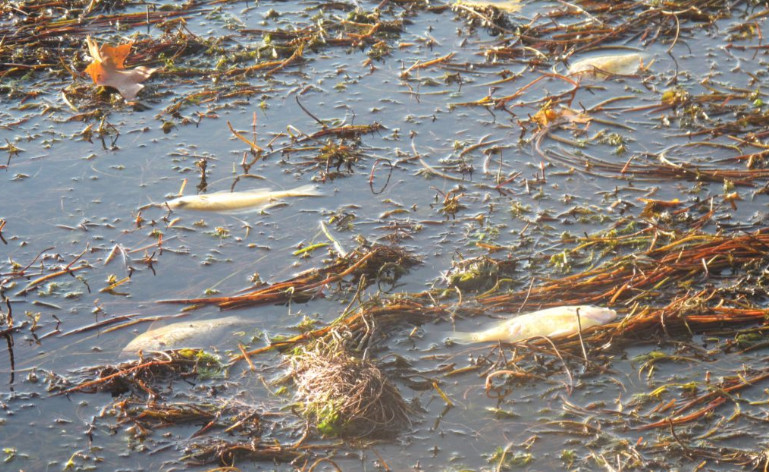CELORON — A rancid smell is being carried on the winds in Burtis Bay.
With a sizable mass of invasive Eurasian milfoil and other weeds collected there, hundreds, perhaps thousands, of fish are trapped, most already dead, with no choice but to frantically flop around in an attempt to escape.
Mike Newell of 10 Chautauqua Place reported severe winds Nov. 3. Those gusts were observed pulling in a mass of weeds he estimated covering the waters about 150 feet away from the shoreline connected to his backyard.
The Eurasian milfoil and other weeds packed together in about a 60-foot space after the weekend’s high winds, trapping fish that were feeding in the area near the shore.
Hundreds of fingerlings, fish that recently spawned this year, were caught near Newell’s break wall with more surfacing, struggling and dying every day. Fully grown yellow perch, sunfish, largemouth bass, black crappie, white crappie and more are also trapped in the mess that continues to be covered by falling leaves. Some of them can be seen fighting to submerge themselves again, only to be picked off by birds who eat the eyes and gills while leaving the rest to rot slowly in the chill fall season.
“We get weeds every fall, but never this heavy,” Newell said.
He mentioned how weeds trapped fish on either side of his area of the shoreline with a rising water level and high winds contributing to the trap that caught hundreds of fish that can be seen and perhaps many more under the surface. The water level released dead weeds from the live ones, resulting in a huge mass that was easily pushed toward shore.
Newell has at least been a part-time resident of the area for 32 years and said he’s never seen anything like this before. He mentioned seeing the weed situation getting progressively worse throughout the years.
“There needs to be a lake management plan put in place,” said Newell, who wants lake groups to think more outside of the box to solve the prevalence of weeds. “I would like to see these different groups work together to set up a multi-faceted plan.”
Weed harvesting, herbicide treatments and stormwater management were all techniques Newell mentioned he would like to see further implemented. He once proposed a weed boom project that would theoretically prevent weeds from grouping together along the shoreline.
“It’s been neglected for too long,” Newell said regarding the weeds along the shoreline. “It’s disheartening.”
He hopes the massive amounts of trapped, suffering and deceased fish will spark further initiative to combat the weed problem. With the massive fish kill in mind, he said a short-term solution is warranted along with a plan for the long-term. Newell also had his boat taken out in October this year, nearly two months before he normally would, in an attempt to avoid further problems with the weeds.
Newell’s residence isn’t far from the newly opened Chautauqua Harbor Hotel, which has also experienced severe blue-green algae levels and weed masses despite the extra harvesting that was ordered before the grand opening in September. Burtis Bay and the Celoron area has fared worse than most shores along Chautauqua Lake according to local residents.
Some think more needs to be done in regard to weed harvesting. Newell suggested the Chautauqua Lake Association recruit volunteers to retrieve more dead weeds during weekends, holidays and evenings when CLA officials are not working.
For now, the trapped fish have no choice but to die and rot as they can’t escape the thick weeds that cover the surface and fill up from the lake bottom near shore. Birds can walk on the weed mass, but fish can’t swim through it, especially not when they’re forced above the water’s surface by the sheer amount of biomass.
Pat McLaughlin, Ellicott town supervisor, said the town budgeted funds for herbicide treatments in 2019 to hopefully help prevent future situations like this.
“I don’t think that’ll be the full requirement,” said McLaughlin, who noted that a multi-faceted approach would most likely be needed to prevent further fish kills caused by the collection of weed masses along the shoreline. “It’s not a good situation.”
He also hopes for more weed harvesting and funding for the Chautauqua Lake Association to implement harvesting in an expanded operating season.
The Department of Environmental Conservation was contacted as well, but did not return comment by press time.
Credit: observertoday.com

